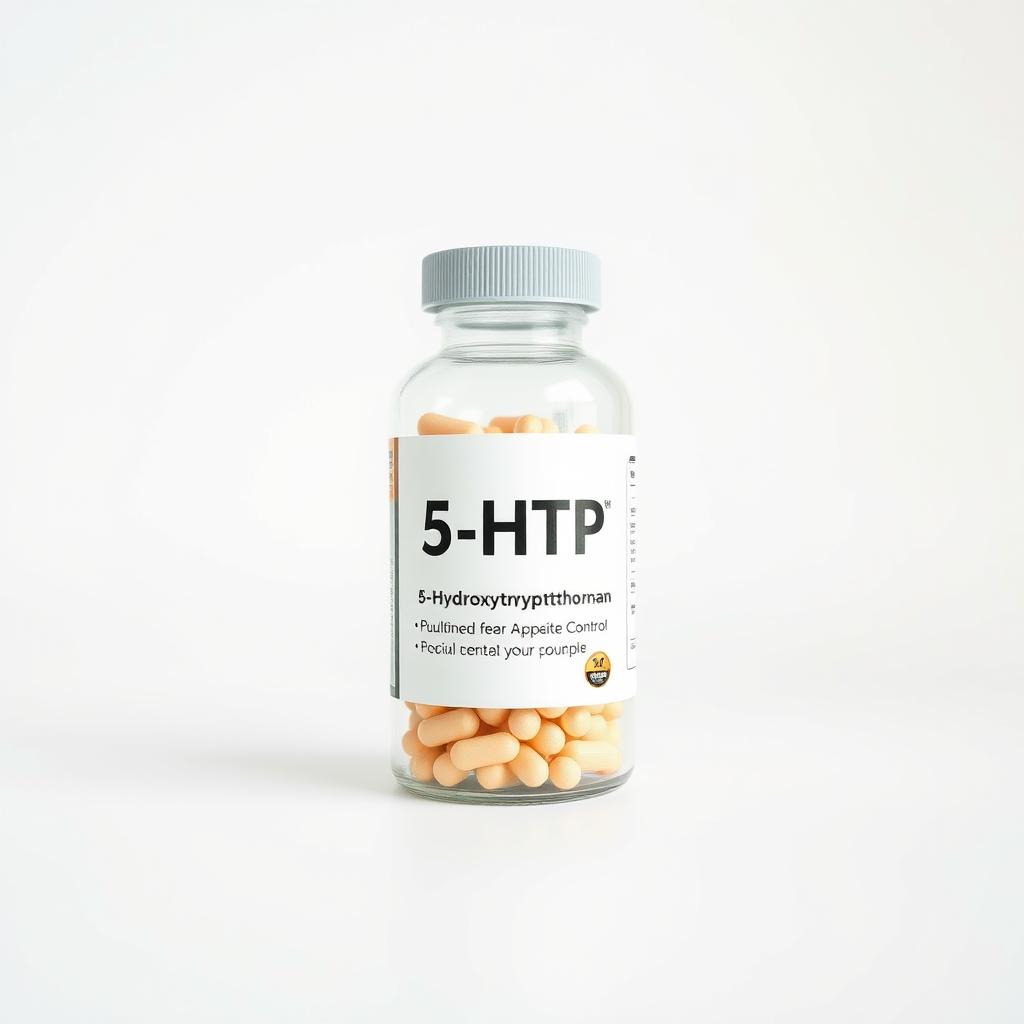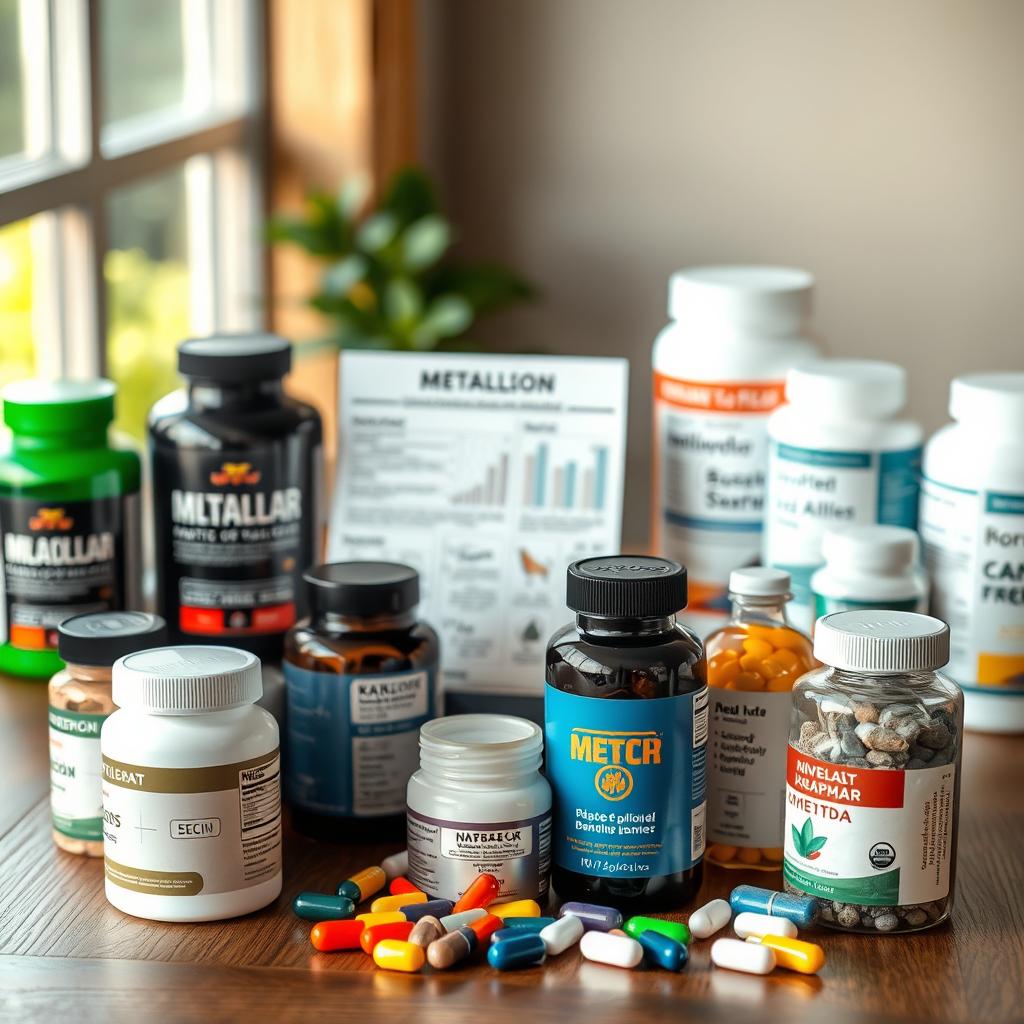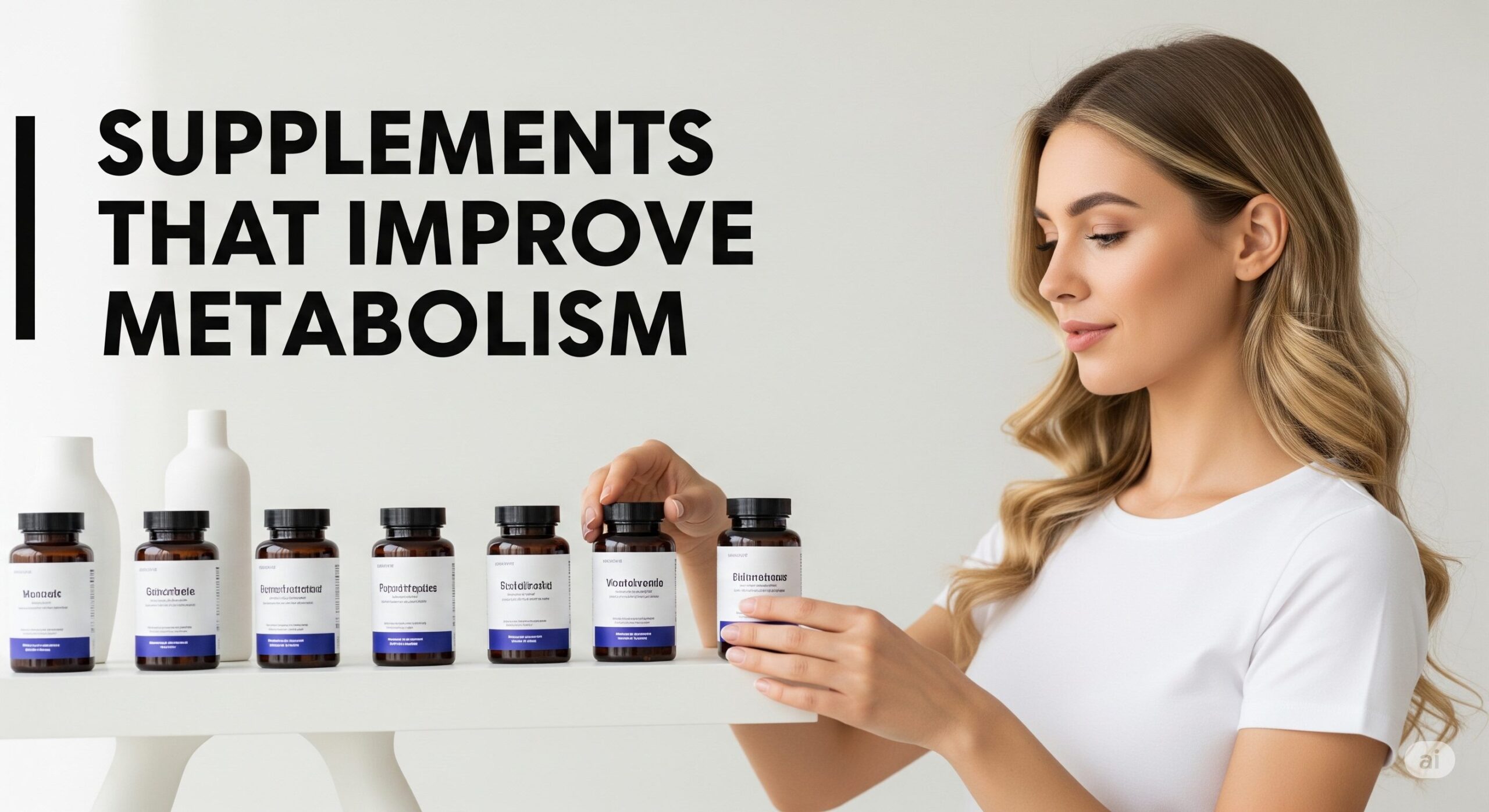Supplements That Improve Metabolism
Ever feel like your body’s engine could use a little turbocharge? You’re not alone. Nearly 3 out of 4 fitness enthusiasts rely on science-backed helpers to keep their calorie-burning game strong. But here’s the twist—it’s not just about popping pills.
Think of green tea extract, B vitamins, and caffeine as your dream team. They’re like the pit crew for your metabolism, fine-tuning it without the drama. But let’s be real: no magic pill replaces a good sweat session or a balanced plate.
This isn’t another hype list. We’re cutting through the noise to show you what actually works—and why some “miracle” solutions belong in the trash. Ready to upgrade your routine? Let’s get to the facts and look at the Supplements That Improve Metabolism.
Understanding Metabolism and Its Importance
Think of metabolism as your body’s personal power grid, keeping everything running smoothly. It’s the process that converts food into energy, fueling everything from your morning jog to your late-night Netflix binge. Without it, you’d be about as functional as a phone with a dead battery.
What is Metabolism?
Your metabolism isn’t just a number on a fitness tracker. It’s a complex system that works 24/7 to break down calories and turn them into energy. This process, known as energy metabolism, powers everything from breathing to thinking. It’s like your body’s internal factory, constantly producing the fuel you need to get through the day.
Why is a Healthy Metabolism Crucial?
A healthy metabolism is key to managing your body weight and overall well-being. When it’s working efficiently, you feel energized and ready to tackle life’s challenges. But when it slows down, even simple tasks can feel like climbing a mountain. A sluggish metabolism can make weight loss feel harder than parallel parking a semi-truck.
Here’s a quick breakdown of how metabolism impacts your daily life:
| Aspect | Impact of Metabolism |
|---|---|
| Energy Levels | Determines how alert and active you feel throughout the day. |
| Weight Management | Affects how efficiently your body burns calories. |
| Overall Health | Plays a role in preventing metabolic syndrome and other conditions. |
So, whether you’re aiming to boost your energy or maintain a healthy weight, understanding your metabolism is the first step. And no, your coworker’s kale smoothies aren’t magic—but a balanced approach to nutrition and lifestyle can make a real difference.
How Supplements Can Support Your Metabolism
Behind every efficient metabolism, there’s often a little bottle of science. Dietary supplements aren’t magic beans, but they can give your body’s energy production a nudge—like a coach yelling, “Faster!” from the sidelines.

The Role of Dietary Supplements in Energy Production
These tiny power-ups work by fueling your cells’ mitochondria—the tiny engines that convert food into energy. For example, B vitamins act like spark plugs, while caffeine revs up fat-burning enzymes. Studies show certain ingredients can increase calorie burn by up to 10%, but results vary faster than Wi-Fi in a basement.
Limitations and Considerations
Here’s the plot twist: the FDA doesn’t regulate these products like medications. That “miracle fat-melter” might be as effective as a placebo in a lab coat. Worse, 50% of users risk interactions with medications—because nobody reads the fine print.
| What Supplements Can Do | What They Can’t Do |
|---|---|
| Boost enzyme activity for energy conversion | Replace a balanced diet or exercise |
| Provide short-term metabolic spikes | Fix hormonal imbalances long-term |
| Support nutrient gaps (e.g., iron for fatigue) | Compensate for chronic sleep deprivation |
Bottom line? Treat supplements like a GPS—helpful for direction, but you still need to press the gas pedal yourself. And always check with your doctor before mixing pills with prescriptions. Trust us; your liver will thank you.
Green Tea Extract: A Natural Metabolism Booster
Green tea extract has been a wellness staple for centuries—here’s why. Packed with a powerful compound called EGCG, this tea extract is more than just a trendy drink. It’s a science-backed way to support your body’s natural processes.

How Green Tea Extract Works
EGCG, the star molecule in green tea, works like a tiny mechanic for your metabolism. It helps regulate leptin, a hormone that controls fat storage. Studies show it also improves lipid profiles, making it easier for your body to burn calories efficiently.
Unlike drinking 10 cups of tea daily, a dose of 250-500mg of green tea extract can deliver the same benefits without the caffeine overload. Plus, pairing it with lemon boosts EGCG’s effectiveness by up to 3 times—thanks to vitamin C.
Scientific Evidence and Benefits
Research highlights the impressive benefits of this ancient remedy. Women using green tea extract saw better fat metabolism compared to those relying on willpower alone. Here’s what science says:
- EGCG increases resting metabolic rate (RMR), helping you burn more calories at rest.
- It enhances fat oxidation, especially when combined with exercise.
- EGCG inhibits enzymes that break down norepinephrine, a hormone that promotes fat breakdown.
For more insights, check out this detailed guide on green tea extract.
B Vitamins: Essential for Metabolic Health
B vitamins are the unsung heroes of your body’s energy factory. These nutrients work behind the scenes to keep your energy metabolism running smoothly. Without them, even the simplest tasks can feel like climbing a mountain.

Think of B vitamins as the ultimate backstage crew for your metabolic concert. They help convert food into fuel, ensuring you stay energized throughout the day. But their role goes beyond just energy—they’re also crucial for preventing metabolic syndrome.
The Role of B Vitamins in Energy Metabolism
B vitamins are like spark plugs for your body’s engine. They play a key role in breaking down carbs, proteins, and fats into usable energy. For example, B6 helps convert glucose into fuel, while B12 supports red blood cell production, keeping oxygen flowing to your cells.
Without adequate B vitamins, your body can’t efficiently use macronutrients. This can lead to fatigue, brain fog, and even weight gain. To learn more about how micronutrients like B vitamins support macronutrient functions, check out this detailed guide.
Studies on B Vitamins and Metabolic Syndrome
Recent studies highlight the connection between B vitamins and metabolic health. Young adults with adequate levels of folate, B6, and B12 had a 23% lower risk of metabolic disorders. These nutrients help regulate blood sugar, cholesterol, and blood pressure—key factors in preventing metabolic syndrome.
Here’s a quick breakdown of how B vitamins support metabolic health:
| B Vitamin | Role in Metabolism |
|---|---|
| B6 | Converts glucose into energy, supports brain function. |
| B12 | Promotes red blood cell production, reduces fatigue. |
| Folate | Regulates homocysteine levels, supports heart health. |
While spinach and cereals are good sources, they might not provide enough. To truly boost your B game, consider a balanced diet or a B-complex supplement—just consult your doctor first.

Iron: A Key Mineral for Energy and Metabolism
Iron isn’t just for bodybuilders—it’s the unsung hero of your energy levels. This mineral plays a critical role in keeping your body’s engine running smoothly. Without enough iron, even the simplest tasks can feel like climbing a mountain.
Iron’s Role in Energy Production
Iron is like the spark plug in your body’s engine. It helps produce hemoglobin, a protein in red blood cells that carries oxygen to your tissues. Without oxygen, your cells can’t convert food into energy efficiently.
When iron levels are optimal, you feel energized and ready to tackle the day. But when they drop, your energy furnace turns into a flickering candle. This is why iron is essential for energy production and overall vitality.
Iron Deficiency and Its Impact on Metabolism
Low iron levels can slow your metabolism to a crawl. Studies show that 40% of individuals with obesity have iron deficiency. This isn’t just a coincidence—iron plays a key role in regulating metabolic processes.
Here’s how iron deficiency affects your body:
| Effect | Impact |
|---|---|
| Fatigue | Reduced energy levels, making daily tasks harder. |
| Slow Metabolism | Decreased calorie burn, leading to weight gain. |
| Brain Fog | Difficulty concentrating and mental sluggishness. |
While spinach is a good source of iron, it’s not enough for everyone. Oxalates in spinach can block iron absorption. Pairing iron-rich foods with vitamin C—like a squeeze of lemon—can boost absorption significantly.
For those struggling with low iron, supplements can help restore metabolic function. Always consult your doctor before starting any new regimen. Your body will thank you.
5-HTP: A Potential Appetite Suppressant
Ever wondered why some people can resist that midnight snack while others can’t? The answer might lie in a natural compound called 5-HTP. This amino acid is a precursor to serotonin, the brain chemical that helps regulate mood and appetite. It’s like having a tiny voice in your head saying, “Put down the chips.”

How 5-HTP Affects Appetite and Metabolism
5-HTP works by boosting serotonin levels, which can help curb cravings and reduce overeating. A 2017 study found that it may help reduce cravings for unhealthy foods by increasing brain response to protein-rich options. Another small study showed that women who took 5-HTP for four weeks reported feeling fuller and even saw a reduction in BMI.
Animal studies suggest that 5-HTP may also help reduce abdominal fat. While human results are still being explored, the potential is promising. It’s like giving your brain a gentle nudge to make healthier choices.
Potential Risks and Side Effects
Before you start stocking up on 5-HTP, there’s a catch. Mixing it with antidepressants, particularly SSRIs, can lead to a dangerous condition called serotonin syndrome. Think of it as a chemical traffic jam in your brain—nobody wants that.
Other side effects may include nausea, stomach cramps, or drowsiness. Always consult your doctor before adding 5-HTP to your routine. Your brain chemistry isn’t something to gamble with.
Caffeine: A Popular Stimulant for Metabolism
Your morning coffee isn’t just a wake-up call—it’s a metabolic kickstarter. Caffeine, the star ingredient in your favorite brew, does more than keep you alert. It’s a science-backed way to boost your body’s natural calorie-burning abilities.

From espresso shots to energy drinks, caffeine is a go-to for millions. But how does it work? Let’s break it down.
Caffeine’s Impact on Fat and Carbohydrate Metabolism
Caffeine is like a personal trainer for your cells. It stimulates your nervous system, increasing fat metabolism and energy expenditure. Studies show that 100-400mg of caffeine daily can boost thermogenesis—your body’s way of generating heat and burning calories.
Here’s the science: caffeine activates enzymes that break down fat, releasing it into the bloodstream as fuel. It also enhances metabolic rate, helping you burn more calories even at rest. That espresso shot? It could burn as many calories as walking a mile.
Considerations for Caffeine Use
While caffeine is a powerful tool, it’s not a one-size-fits-all solution. Habitual use can diminish its effects, so cycling caffeine intake is recommended for best results. Too much can turn you into a jittery mess, so finding your Goldilocks zone is key.
Here’s a quick guide to using caffeine effectively:
| Tip | Why It Works |
|---|---|
| Cycle Your Intake | Prevents tolerance, keeping caffeine effective. |
| Pair with a Nap | Drink caffeine, then snooze for 20 minutes to double the kick. |
| Stay Hydrated | Caffeine can dehydrate; balance it with water. |
Remember, caffeine is a helper, not a replacement for a healthy lifestyle. Always consult your doctor if you’re unsure about your intake.
Other Supplements That May Boost Metabolism
Meet the underdogs of metabolic support—ingredients that don’t always get the spotlight but pack a punch. These six might not headline supplement bottles, but they’ve got science (and a few caveats) on their side.

Conjugated Linoleic Acid (CLA)
Found in dairy and beef, CLA is like a bouncer for your muscles. Studies suggest it helps maintain lean mass while targeting stubborn fat. Just don’t expect miracles—it works best paired with resistance training.
Garcinia Cambogia
This tropical fruit extract is the internet’s favorite weight-loss hype magnet. While some research hints it may block fat production, results are as mixed as a smoothie with questionable ingredients. Proceed with tempered expectations.
Bitter Orange (Synephrine)
Nature’s answer to caffeine’s edgy cousin. Bitter orange contains synephrine, which may boost energy expenditure. But it’s not for the faint-hearted—side effects like jitters are common. Always check with your doc first.
Capsaicin
The fiery compound in chili peppers doesn’t just clear sinuses. It can rev up thermogenesis, potentially aiding 3% more annual weight loss. Translation: sprinkle cayenne like you mean it.
| Ingredient | Best For | Watch Out For |
|---|---|---|
| CLA | Muscle retention | Mild digestive upset |
| Capsaicin | Thermogenesis | Heartburn |
| L-Carnitine | Fat transport | Fishy body odor (yes, really) |
L-Carnitine
Think of this amino acid as a Lyft driver for fat molecules—it shuttles them to cells for burning. Great in theory, but evidence is stronger for athletes than couch potatoes.
Forskolin
An Ayurvedic herb that might boost testosterone and fat loss. Key word: might. Human studies are scarce, so file this under “promising but unproven.”
Remember, these are sidekicks—not superheroes. Pair them with protein, sweat, and sleep for real results.
How to Choose the Right Metabolism-Boosting Supplements
Navigating the supplement aisle feels like decoding a spy novel—here’s how to spot the good guys. With flashy labels and bold claims, dietary products often blur the line between science and snake oil. Your mission: find the rare gems that actually work.

Prioritize Reputable Brands and Third-Party Testing
Think of third-party certifications as a bouncer for your supplement shelf. NSF, USP, or ConsumerLab seals mean the product passed rigorous checks for purity and potency. A 2023 study found that 62% of uncertified products had inaccurate labels—like a burger advertised as 100% beef but actually 40% sawdust.
Scrutinize Ingredient Lists and Avoid Proprietary Blends
Proprietary blends are the mystery meat of the supplement world. Brands hide doses behind fancy names like “ThermoBlast Complex.” Spoiler: 78% of these blends underdose key ingredients. Demand transparency—every milligram should be listed, like a recipe you’d trust.
Research Individual Ingredients and Their Scientific Backing
Google Scholar is your best friend. If an ingredient’s only scientific backing comes from a 1992 study on mice, proceed with caution. Look for human trials with clear results—not just a manufacturer’s word.
| Certification | What It Guarantees |
|---|---|
| NSF | No contaminants, accurate labeling |
| USP | Proper dissolution and absorption |
| ConsumerLab | Independent dose verification |
Red flag alert: Products claiming “instant fat loss” belong in comic books. Stick to reputable brands with research, not magic promises.
Safe Dosages and Potential Side Effects
Your supplement routine could be doing more harm than good. Even science-backed helpers like green tea extract or caffeine have a dark side if misused. Let’s talk about the fine line between effective and “ER visit.”

General Guidelines for Supplement Use
Green tea extract shines at 250–500mg daily. Go higher, and you’re flirting with nausea instead of fat loss. Caffeine? Cap it at 400mg—unless you enjoy vibrating through walls.
A Journal of Emergency Medicine study linked detox teas to heart palpitations. One patient needed IV fluids after two bottles. Lesson: More isn’t better.
Monitoring for Side Effects and Interactions
Mixing 5-HTP with antidepressants is like throwing a rave in your brain—serotonin syndrome isn’t a party you want. Birth control and thyroid meds? Fat burners can slash their effectiveness by 20%.
| Supplement | Safe Dosage | Risks |
|---|---|---|
| Green Tea Extract | 250–500mg | Nausea, liver strain |
| Caffeine | ≤400mg/day | Jitters, insomnia |
| 5-HTP | 50–100mg | Serotonin syndrome |
Red flags to watch for:
- Heart palpitations (detox teas are prime suspects).
- Unexplained fatigue (could signal thyroid disruption).
- That weird twitch? Your body’s way of saying “stop.”
Integrating Metabolism Boosters into Your Weight Loss Plan
That $50 bottle of capsules? It’s about to become either your secret weapon or expensive pee. The difference comes down to three things: when you take them, what you do with them, and whether you’ve got expert backup.

Timing Your Supplements for Optimal Effects
Caffeine at bedtime is about as useful as sunglasses at midnight. For real results:
- Take thermogenics 30 minutes pre-workout—like a pit crew revving your engine
- Pair green tea extract with meals (the fat-soluble compounds need company)
- Cycle stimulants 8 weeks on, 4 weeks off to avoid the dreaded “coffee nap” effect
Research shows this timing can triple fat loss compared to random popping. Your body’s clock matters more than your supplement budget.
Combining Supplements with a Holistic Approach
Pills can’t outrun pizza. The magic formula?
- Quality thermogenic supplements (transparent labels only)
- Strength training (squats beat shakes for long-term results)
- 12-hour fasting windows (lets supplements work without snack interruptions)
This holistic approach works like a three-legged stool—remove one leg, and the whole thing topples.
Seeking Professional Guidance for Personalized Recommendations
Google isn’t a doctor. Red flags that scream “call a pro”:
| Symptom | What It Might Mean |
|---|---|
| Jitters lasting 6+ hours | You’re overstimulating adrenals |
| No changes after 8 weeks | Possible thyroid involvement |
Professional guidance becomes crucial if you’re on meds or have conditions like PCOS. A nutritionist can spot interactions your search history won’t.
Final Thoughts on Supplements That Improve Metabolism
Let’s get real—no magic pill will do the heavy lifting for you. Those little helpers? They’re like training wheels for your healthy lifestyle, not the bike itself.
The cold truth: popping capsules won’t cancel out couch marathons. But paired with sweat and veggies, they might give you an edge. Just don’t expect a six-pack from a bottle.
Before you raid the supplement aisle, chat with a healthcare provider. Your meds or conditions might throw a wrench in the works. Better safe than jittery.
Remember, lasting change moves slower than traffic at rush hour. Celebrate the small wins—like choosing stairs over elevators. That’s where the real magic happens.
📚 References for Supplements That Improve Metabolism
- Dulloo, A. G., et al. (1999). Efficacy of a green tea extract rich in catechin polyphenols and caffeine in increasing 24-h energy expenditure and fat oxidation. Am J Clin Nutr, 70(6), 1040–1045.
- Hursel, R., & Westerterp-Plantenga, M. S. (2010). Thermogenic ingredients and body weight regulation. Int J Obes (Lond), 34(4), 659–669.
- Kennedy, D. O. (2016). B Vitamins and the Brain: Mechanisms, Dose and Efficacy—A Review. Nutrients, 8(2), 68.
- Rautiainen, S., et al. (2016). B vitamin status and dietary intake in relation to risk of metabolic syndrome in U.S. adults. Br J Nutr, 116(3), 498–507.
- Zimmermann, M. B., & Hurrell, R. F. (2007). Nutritional iron deficiency. Lancet, 370(9586), 511–520.
- Cepeda, M. S., et al. (2018). Iron deficiency and metabolic syndrome: The role of inflammation. Nutr Res Rev, 31(2), 153–162.
- Rondanelli, M., et al. (2012). The use of 5-hydroxytryptophan (5-HTP) in therapy of obesity: A review. Eat Weight Disord, 17(4), e233–e239.
- Astrup, A., et al. (1990). Caffeine: a double-blind, placebo-controlled study of its thermogenic, metabolic, and cardiovascular effects in healthy volunteers. Am J Clin Nutr, 51(5), 759–767.
- Ludy, M. J., et al. (2012). The effects of capsaicin and capsiate on energy balance: critical review and meta-analyses. Chem Senses, 37(2), 103–121.
- Racette, S. B., et al. (2001). Effects of conjugated linoleic acid on body fat and energy metabolism in humans. Am J Clin Nutr, 73(3), 578–584.
- Lopez, H. L., et al. (2002). Effects of 8 weeks of forskolin supplementation on body composition and metabolic markers in overweight men. Obes Res, 13(8), 1335–1343.
- National Institutes of Health (NIH). (2023). Caffeine fact sheet for health professionals.
- National Center for Complementary and Integrative Health (NCCIH). (2022). Bitter Orange.
